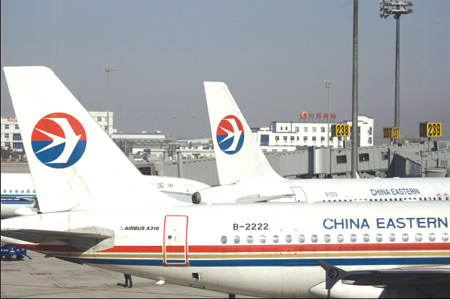Mainland airlines returning to black
Updated: 2009-12-10 07:26
By Joey Kwok(HK Edition)
|
|||||||
|
China Eastern Airlines Corp airplanes are parked at Beijing Airport. The company said last month that it will complete its merger with Shanghai Airlines by the end of this year as it seeks to dominate air travel in the nation's financial capital. Bloomberg News |
HONG KONG: After plunging deep into the red in 2008, mainland carriers are likely to emerge from their financial clouds this year, benefiting from the country's economic resurgence and the rebound in domestic air travel, according to industry experts and analysts.
Hit with hefty fuel-hedging losses and weakened passenger numbers, major airlines on the mainland, including Air China, China Eastern Airlines and China Southern Airlines, booked a total net loss of 27.9 billion yuan last year.
The worst seems to be over, as crude oil prices and domestic air travel demand gradually pick up amid the country's economic recovery.
Air China, the world's biggest airline by market value, has booked a net profit of 885.3 million yuan for July to September, compared to a net loss of 1.97 billion yuan a year earlier.
Taking advantage of the rebound in crude oil price, Air China has gained 553.6 million yuan, mainly from its fuel-hedging contracts during the three-month period.
The fuel-hedging gains also gave a boost to China Eastern and its bigger rival China Southern, which reported third-quarter earnings of 23.16 million yuan and 284 million yuan, respectively.
The central government earlier injected a total of 12 billion yuan into China Eastern and China Southern, to help stabilize and reverse their faltering financial condition.
While international carriers are still suffering from the impact of global economic recession, analysts expect airlines on the mainland to report satisfactory earnings in 2009.
"Domestic air travel on the mainland is performing quite well this year, although passenger volume of the routes to the US and Europe have yet to recover," said Ricky Tam, director at Champlus Asset Management.
Tam added that mainland airlines may have to rely on the domestic market to fuel their earnings in the short term.
He also noted that the new fuel surcharge pricing mechanism, approved by the central government in November, will allow mainland airlines to offset the increase in fuel costs.
"The new surcharge will help lower the fuel cost, which currently account for 30 to 40 percent of the total cost of the mainland airlines," Tam said.
However, he added that domestic air passengers will still be the key revenue driver for the mainland airlines.
Tam also expects China Southern to post the most robust growth in 2009 earnings, because of its strong network in the domestic airline market.
The massive economic stimulus package on the mainland has helped the country's air travel volume to recover faster than expected.
In the first nine months of 2009, the number of air travelers on the mainland leaped 20 percent from a year earlier to reach 170 million, according to the National Bureau of Statistics.
The jump in air passenger numbers was well above the 4.4 percent and 3.5 percent increases in railway and road travel, respectively.
Despite the robust growth in domestic air travel, mainland carriers are expected to face tough competition from the new high-speed railways, as the Ministry of Railway laid down its blueprint to build 16,000 kilometers of fast trains by 2020.
The high-speed railways will cover 70 percent of the key cities, mainly in the eastern and central mainland, with a combined population of more than 50 million.
Si Xianmin, chairman of China Southern Airlines, said in November that 38 of the airline's 160 domestic routes will compete directly with the high-speed railway lines.
Investment bank Nomura believes China Southern to be "the most affected" by the construction of high-speed railways, as the domestic market currently contributes 80 percent of the airline's revenue.
However, Castor Pang, research director of CINDA International Holdings, said the high-speed railways may not immediately impact domestic air travel, as passengers still rely on domestic airlines for traveling to the major tourist hot spots in southwestern or western part of the mainland.
"The railway development may give pressure to the mainland airlines in the longer term, as the government focuses to spur economic growth through new infrastructure projects in the country," Pang said.
He added that the mainland carriers may continue their merger and acquisition activities in the near term, to trim costs and remain competitive.
China Eastern Airlines said last month that it will complete its merger with Shanghai Airlines by the end of this year.
Shares in Air China yesterday finished down 3.14 percent, or HK$0.19, to close at HK$5.87, while China Eastern dropped 3.34 percent, or HK$0.10, to HK$2.89, while China Southern slid 3.68 percent, or HK$0.10, to close at HK$2.62.
(HK Edition 12/10/2009 page4)
